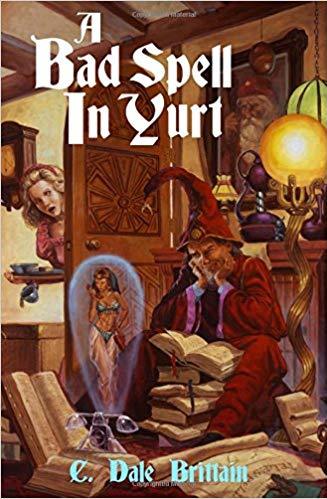
The Wizard of Yurt is a fantasy series by C. Dale Brittain, combining Medieval European Fantasy with mystery. It is currently ten books long.
The protagonist is a perfunctorily "school-trained" wizard named Daimbert who is assigned as the Royal Wizard to one of the smaller kingdoms in the loose confederation he was born into. There are three estates: royalty, the church, and wizardry. Magic, as carried out by wizards, magicians and witches, is opposed to "the supernatural" - the actions of churchmen enlisting the aid of saints or of evildoers making deals with demons from Hell. Most of the setting is heavily Christian but "the East" is a mixture of Islamic kingdoms and a Christian Byzantine analog. In the East, the two estates of wizardry and royalty are merged, as are the estates of royalty and church in the Islamic kingdoms. Within "natural" magic, there are various schools, such as light and air, fire, blood and bone, etc.
A typical story involves several mysteries at once and Daimbert as the principal investigator of most or all of them. Conflict in the series arises from the tension between church and magic, which is somewhat abridged by Daimbert's friendship with Father Joachim, originally the Royal Chaplain of Yurt, and later from tension among all the estates. Personal conflict for Daimbert includes jealousy among the students of his wizard school class, a long unrequited love for the Queen of Yurt, and his relationships being squeezed between the wizard's rules against marriage and the church's rules of celibacy unless married.
Thus far, the series consists of the following (listed in release order, parenthesis indicate in-universe chronological order):
- A Bad Spell In Yurt (1)
- The Wood Nymph and the Cranky Saint (2)
- Mage Quest (4)
- The Witch and the Cathedral (6)
- Daughter Of Magic (7)
- Is This Apocalypse Necessary? (9)
- The Lost Girls And The Kobold (3)
- Below the Wizard's Tower (5)
- A Long Way 'Til November (8)
There is a sequel series focusing on the first girl to attend the wizards' school, and how she balances that education with her mother's (a "witch") traditions.
- The Starlight Raven
- An Autumn Haunting
- The Sapphire Ring
Examples:
- Court Mage: Daimbert serves as the Royal Wizard of Yurt. Other kingdoms also have a royal wizard (it's a standard position for them) and even some lesser nobles and rich merchants: the second book sees Yurt's duchess hire a "ducal" wizard.
- Fantasy Counterpart Culture: The setting is clearly an alternate version of Medieval Europe. A Byzantine East and Muslim world also exist. Unlike in many fantasies, the religion is even explicitly Christian, without even changing the name (specifically, Catholic).
- Language of Magic: Wizards speak in the Hidden Language to work magic (out loud or in their minds).
- Mage Tower: Daimbert's predecessor had lived in a tower of the castle, but he's given a normal room. He thinks this is less becoming for a wizard.
- Magical Society: The wizards have an order which provides them with training and jobs, but also mandates rules like celibacy.
- Magitek: Though most of the technology is just like that of Medieval Europe, magical lights, telephones and air carts (which seem akin to flying cars) exist as well.
- The Magocracy: In the East, wizards also rule, unlike within the Western kingdoms.
- Odd Friendship: Daimbert and Joachim rapidly become close friends despite their completely different temperaments and their respective superiors telling them that magic and religion don't mix.
- Rapid Aging: King Haimeric is in fact much younger than he looks. However, he aged rapidly in a mere four years due to a spell. Daimbert's first task is to find out who's behind it.
- Unequal Rites: There's tension between wizards who use magic (deemed "natural") vs. clergy and evildoers invoking saints or demons (i.e. the "supernatural"). Both wizards and clergy are taught they're incompatible. Many clerics are suspicious about magic, thinking it's often the "black arts" (although wizards don't believe in such a concept-intent is what matters). Wizards on the other hand often resent religious strictures.
- Vow of Celibacy: The clergy in the West are sworn to celibacy (they're a Catholic analogue) but so are wizards. It causes headaches for Daimbert, who finds a lot of women tempting. He's at least allowed to check them out or flirt-priests are forbidden even that.
- Wizard Classic: Daimbert tries to make himself look more like one, growing a beard then dying it gray, buying some wizardly getup (though not quite of classic variety) then lamenting that he's not placed in a tower nor has any staff to carry around.
- Wizarding School: Daimbert attended and graduated from one in the City. It's said these are no older than forty years, with he being the first who graduated who is Royal Wizard of Yurt. His predecessor was apprenticed, like all wizards before its opening.
- Wizards Live Longer: Daimbert's predecessor is around two hundred years old. Wizards can extend their lives with magic, though they'll still die eventually.
